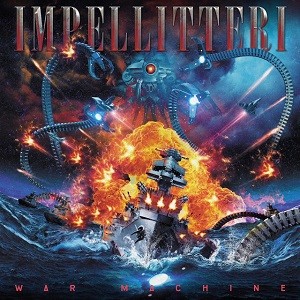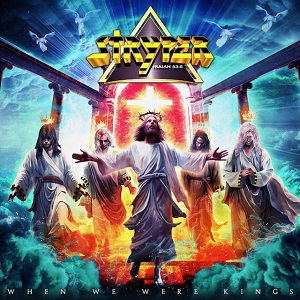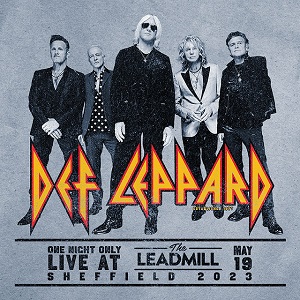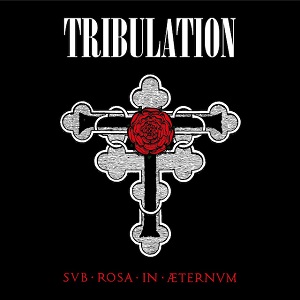CATHEDRAL – “Religion Causes More Harm Than Good”
May 6, 2010, 14 years ago
By Aaron Small
The Guessing Game – the new double album from Britain’s CATHEDRAL, marks the band’s 20th anniversary – and what a celebration it is. Best summarized as an exotic sonic kaleidoscope, The Guessing Game is: quirky, heavy, psychedelic, groovy, progressive, funky and doom-laden. A vastly diverse and wildly varied musical journey spanning 13 songs. Moreover, The Guessing Game ends the five-year drought since Cathedral’s previous effort, The Garden Of Unearthly Delights, from 2005.
“It doesn’t actually seem that long, it only seems like yesterday that we did that album,” says vocalist Lee Dorrian. “A lot of those five years was spent really reflecting and planning the next move because I admit, there were times after doing the last album; we didn’t really know where we could go after that. Especially ending it with that long song ‘The Garden’. Trying to imagine where to go after that was a bit daunting really. I suppose we always treat each album like it’s the last anyway. We thought if that was going to be the last recording, it’d be quite a good one to leave on. But then me and Gaz (Jennings, guitarist) got together about a year and a half after it came out and we’d done the touring and everything. We said before we make any decisions, we really need to know what our reasons for wanting to carry on are, if we’re going to carry on. We’ve got to make sure we make the right move and do the right record, just for ourselves as much as anything else. After all this time, we’re in no real rush to prove anything. The beauty of being where we are at the moment is that we can take our time. So when we first got together, we started coming up with ideas. We both agreed that if we come up with stuff we feel is right and has a good vibe, then we’ll take it to the next step. But it took a while.”
Early sessions occurred rather casually at Lee’s house. “When we first started writing, Gaz would bring his guitar down here to London and just plug into an old Sound City Combo Amp I’ve got in the living room. We just came up with ideas on the spot really. Initially, they were all very extreme doom. I don’t know what the reason for that was? But that just seemed to be what was coming out. So there’s pretty much a whole album’s worth of stuff we didn’t record, which is kind of like the first album (Forest Of Equilibrium). After a while, we thought as much as we were into that stuff, the budget’s quite good for the record, so we could really go to town and do all the things we’d wanted to do before and just make a really good Cathedral record, as opposed to treading on old ground. Then we started coming up with newer songs, which are actually on the album. We felt the vibe was going in the right direction. Gaz came down about four times to London, like two and a half years ago. We’d record these sessions on cassette and listen to them for a couple of months, trying to get our heads around the direction we were going in, what kind of shape the songs were taking. Pretty much about a year ago, March last year I guess, we thought we had enough material written – including lyrics. That’s when we presented them to the band (bassist Leo Smee and drummer Brian Dixon) and we started rehearsing. It wasn’t that vigorously actually, a weekend every couple of months until we got to the stage where we were getting closer to the studio and then we started rehearsing quite heavily. Overall, it was an album we really took our time with, more so than ever before. There have been times in the past where records have been rushed. The older you get and the more you do this, the less you want that to happen.”
Despite its glorious outcome, Dorrian admits The Guessing Game was not intended to be a double album. “No, like every time bloody Cathedral start writing, we always aim for it to be a classic album’s length – 45 to 50 minutes – but it never fucking turns out that way! When you listen to some of the songs, we never realized they were seven or eight minutes; and that’s the shortest tracks. They actually feel like they’re three or four minutes. It’s really weird. I suppose because you get so close to them and you know the parts inside out, they don’t seem as long as they are. But then of course when we got into the studio, we started writing more songs as well. I think our producer (Warren Riker – DOWN, CROWBAR) was about to have a nervous breakdown on us. We had all these newer songs; we even scrapped a couple and wrote about four more in the studio. This creative rush just came out of us. In the end, we’d worked quite hard on it and we thought either we lose half the songs or we do it as a double. There’s nothing worse than a CD full to the last minute of stuff just because it can be there. I hate that more than anything. I’d rather have a 45 or 50-minute album, as opposed to a 79-minute album with loads of crap on the end of it. We wanted it to be presented in a classic double album kind of way, as opposed to it being a load of bonus tracks on a spare disc. It gives a different perspective. People have to digest it a bit more. As opposed to it being back to back, you can play it in two different parts really.”

With such a plethora of music to record, a quick studio visit was not in the cards. “It’s the longest time we’ve ever spent in the studio actually. It was like a month. But even then, we didn’t get it finished. The last week we were there, we were leaving on the following Saturday and this was the Sunday – Brian, Gaz and Leo had split the studio – got extremely damaged, so wasted! On the Monday morning I realized, fucking hell, we haven’t mixed one track. And we haven’t done any vocals properly. We’d only done a few scratchy vocals here and there. I think Warren had just started mixing one of the instrumental tracks. Then we were going to do vocals and do a mix as we went along. But I realized we only had something like five days left, so I started freaking out a bit. I had to change my whole body clock around. I started going to bed at 9 at night and was doing vocal tracks at 6 in the morning. It got a bit, I wouldn’t say stressful but otherworldly really. Knowing that you’ve got a deadline to beat and trying to adapt added a little bit more intensity to the whole thing. Whether that was good or bad, I don’t know? But I think it turned out all right. We didn’t bother mixing it at Chapel Studios. Warren took everything home and mixed it back in The States, which is probably more beneficial anyway ‘cause he’s more used to the surroundings.”
The opening track on The Guessing Game, ‘Immaculate Misconception’, ends with the sound of a baby crying, which would seemingly represent the birth of man. “I don’t know about man as in the whole of mankind but maybe the birth of an individual,” clarifies Dorrian. “It’s called ‘Immaculate Misconception’ but that was basically an instrumental track that Leo had and wanted to use. I just thought, the next track’s called ‘Funeral Of Dreams’ and it’s kind of about growing up. You’re born and you have all these dreams, yet everyone’s looking down on you, telling you. ‘Enjoy your childhood while you’ve got it’ and that kind of stuff. You also kind of see the way you gradually get brainwashed and conditioned into being something that is totally a million miles away from who you actually were when you were born. The song ‘Funeral Of Dreams’ is about coming to terms with all that really. It’s not a completely negative song. Towards the end, it’s just about embracing the good people that do exist on this Earth and the good people I’m happy to share it with, as opposed to the vast majority I probably don’t. ‘The Immaculate Misconception’ is not necessarily the birth of man. It’s kind of the birth of corruption I suppose. From the day you’re born you’re no longer yourself, because people around you already have plans for the way you’re going to think and who you’re going to be. It’s almost like as you get older, you’re almost working your way backwards to try and find out who you really are – before they stripped all that away from you.”

Exploring The Guessing Game further, ‘Death Of An Anarchist’ is lyrically profound, containing the lines: “The word love people say with shame, but in this heart, there’s a burning flame.” Love is a word that gets tossed around excessively in this day and age. According to Lee, “That’s a song more about the way people are to each other as opposed to a specific thing. The way that society creates division amongst people, and people’s hunger for wealth Their ambition not being anything other than to benefit themselves. It ‘s about the disillusionment with all that really. Growing up the way I did, listening to bands like CRASS and CONFLICT. By the time I was 16, I used to call myself an anarchist. I used to read a lot of literature. The philosophy of anarchy I still find very appealing. If anything, it’s the only thing I do kind of believe in. People say to you, ‘It’s just a philosophy.’ It might be just a philosophy but it’s a good one! Everyone being allowed to be themselves without causing harm to each other is the basic principle of it. Tell me what has fucking worked in this so-called society: communism, fascism? The current state of affairs in the world is absolutely the worst it’s ever been. But at the end of the day, you face the cold reality of, that’s the way it is. You’ve got to deal with it somehow. I’m not the angry young kid I used to be 25 years ago. You just have to learn how to tolerate things a bit more and deal with people in a more down to earth way, as opposed to shouting all the time.”
‘Death Of An Anarchist’ features another interesting line: “There is no God, just you and me.” Religion isn’t a new subject for Cathedral, yet Lee felt it needed re-addressing. “It’s just an off the cuff phrase really. I don’t really have a problem with people who are religious or whatever. But at the end of the day, it seems to me that religion causes more harm than good. As far as I’m concerned, people deny themselves when they worship a god. My whole concept has always been that everyone should be allowed to be who they are. From the day you were born, your individuality is the most precious gift you have really. I wouldn’t call myself an atheist, ‘cause to me that’s another label, almost in the same way calling yourself an anarchist is really. It’s a complete contradiction in terms in many respects. I don’t know what lies beyond? All I know is what I see with my own eyes. And all I see is the world going down hill! People talk about Heaven being a place beyond this. Well who’s to say this isn’t really Heaven and we’re just making a pig’s ear of it? A song like ‘The Casket Chasers’ represents those people who live to die. They just can’t wait to die to get to a better place and in the process, make the world a shit place for the rest of us to live in.”

Cathedral’s record company Nuclear Blast is touting ‘Requiem For The Voiceless’ as the first doom animal rights song. “Maybe it is,” chuckles Lee. “I’ve been a vegetarian since I was 11, that’s over 30 years ago. I probably would have been sooner if I’d had the confidence. I remember as far back as being seven or eight years old, in the butcher’s shop on a Saturday afternoon with my parents and looking at all the pigs hung up. The smell, the lighting and the whole atmosphere of the butcher’s shop – from a very early age made me feel appalled really. Every Saturday I used to stand outside while they went in and got their pound of flesh or whatever. Again, going back to bands like Crass and Conflict, when I started listening to those bands, I got more and more into animal rights. They’re the catalyst for it really. It’s something I’ve been close to all my life. I think the way man treats his fellow beings is absolutely shameful. They’re living beings, they’re not pieces of shit. It’s kind of hard living in this world when you feel the way I do, ‘cause all you see constantly is the complete abuse of animals. You have to find a way of shutting your mind off from it ‘cause it’ll drive you crazy. That’s why people call animal rights activists extremists.”
Album closer ‘Journey Into Jade’ is somewhat surprising as lyrically, it chronicles the history of Cathedral. “Lyrically in general, I was trying not to be the same kind of out there… to write Cathedral lyrics is not an easy task. Each time you feel you have to go further than you did before. I don’t really know the true reason why? It’s part of being in the band I suppose. This time I wrote lyrics that came to me naturally as opposed to trying to find them. I thought we should try and do things a little bit differently in general in that respect. I was listening to the riff and had an idea about doing the story of the band. It seemed like a good idea to do it now that the album was released this year, cause it’s 20 years since we’ve been around. There’s no big deal to it or anything. The end of the song is kind of… I sometimes get the feeling that people won’t really understand what we’re about until we’re not actually here anymore. Maybe in 30 or 40 years time, someone might get what we were trying to do. It’s not that people don’t get what we’re doing now. I just think a lot of people really don’t understand what we’re about, because there is no definite game plan to what we do. I realize we’re not easy to categorize. It’s almost like I’m asking questions to people in the future saying, are we cool yet?”

The hidden track at the end of The Guessing Game features narration from Cathedral cover artist Dave Patchett. “I thought that was a pretty cool thing to do. I went down to see him and just recorded him talking about the painting on a little recorder. Then there was a bit of backwards guitar that Gaz recorded and we didn’t know what we were going to use it for. So just as the album’s ended, you chill out for a few minutes and then some visual spoken word stuff comes in. I wouldn’t say it explains the concept of album, but gives you an idea of it from the artist’s mouth. What you see as the front cover is a bit misleading. When you open it all up, it turns into a big question mark. Believe me, it’s not all as pleasant as what you see in that first section. It’s like the evolution of mankind I suppose, with a big pit at the bottom of it. It’s quite a mad picture actually. I suppose the essential thing behind it is, the why are we here and where do we go? Those questions and how they lead people to absolute acts of madness. People constantly trying to find their spirituality and reason for existence, that’s why it’s called The Guessing Game.”











